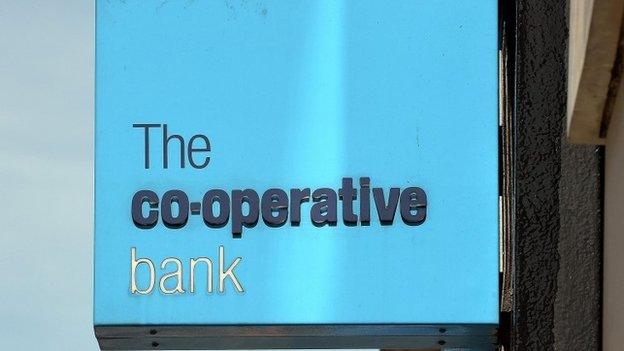Osborne cleared of interference in Co-op bank shambles
- Published
- comments

After many months of testy hearings - and many months of delay - I am told that the Treasury Select Committee is close to finalising its report on the shambolic attempt by Co-op Bank to take over 632 branches of Lloyds.
This £750m deal soon descended into chaos after it was revealed that the Co-op Bank was carrying a £1.5bn capital shortfall. The sorry tale became a byword for all that was wrong in the UK's financial services sector - hubris mixed with ignorance mixed with rank incompetence.
You can read about the gory aftermath of the Co-op/Lloyds 2013 deal collapse here.
The Treasury Select Committee launched an inquiry following the announcement. The committee's hearings became car-crash box office. In one, the bank's chairman, Paul Flowers, admitted that he did not know the most basic facts about the bank he was the head of.
Such as the size of the balance sheet.
He also appeared to have almost no banking qualifications.
Andrew Tyrie, the chairman of the committee, described Flowers as a "financial illiterate". To add to the rich mix, Flowers was subsequently charged and pleaded guilty to the possession of cocaine, methamphetamine and ketamine.
Three key questions
I am told that a final draft of the select committee report is now circulating, and it focuses on three key questions, beyond the mess at the Co-op Bank itself.
Firstly, did the Treasury meddle inappropriately in the deal, encouraging Lloyds to agree to the Co-op offer because they were hyper-keen on a new, bigger "mutual" banking player on the high street?
Second, should the regulator have done more to pre-vet Flowers among others about their suitability to run a bank which would have grown to a 7% share of the retail banking market in the UK if the deal had gone through?
Thirdly, should the auditing process put in place by the board have done more to uncover the terrible state of the Co-op's balance sheet?
On George Osborne and the Treasury's role in the deal, I am told that the final draft of the committee report clears both of any undue pressure.
This will come as a disappointment to Lord Levene of Portsoken, who led the competing offer on the table at the time of the Co-op deal, that of the banking shell NBNK.
He has alleged that the government pushed Lloyds to choose the Co-op Bank as preferred bidder.
The Committee is expected to side with the chancellor who said that no such influence was brought to bear.
The draft is also expected to say that although the Treasury has been reluctant to share details of its contacts with Co-op and Lloyds following the preferred bidder announcement, it would like to see that issue dealt with by way of subsequent inquiries into the whole sorry affair.
There are certainly enough of them. The Financial Conduct Authority, the Treasury itself and the Financial Reporting Council are all looking at the bank's collapse.
On the question of whether the regulator should have done more the committee is likely, I am told, to have some withering words for the now defunct Financial Services Authority which agreed to Flowers' appointment.
It also allowed a governance system for the bank, under the then ownership of the Co-op Group, which was not fit for a rapidly growing financial institution.
The bank's board included a plasterer, a horticulturalist and a nurse - not professions renowned for their high levels of financial sector expertise.
On how the Co-op ran its auditing process, there are also likely to be damning conclusions.
In his separate report on the bank's collapse, Sir Christopher Kelly said that the auditors, KPMG, were only asked to conduct "cursory" due diligence of Co-op's earlier takeover of the Britannia Building Society.
Sir Christopher said that the takeover of Britannia in 2009 was one of the key reasons for the Co-op's disastrous implosion.
If the draft of the Treasury Select Committee makes it through the amendment process, it will once again resurrect just how asleep at the wheel so many involved in financial services sector were, while banks careered towards the cliffs.
Though now well after the horse has bolted and run away over the hills (the Co-op Bank is now largely owned by American investors), it will make for essential reading.